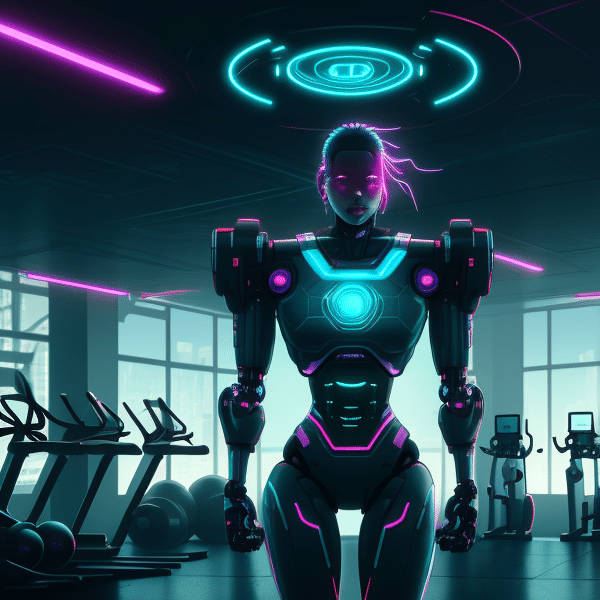
As technology continues to evolve at an unprecedented pace, artificial intelligence is making its way into every aspect of our lives. One of the areas where AI is becoming increasingly popular is fitness training. AI-powered fitness apps and devices are advancing and in a way, transforming the way we work out, providing “personalized” coaching, tracking progress, and even the ability to create “custom” workout plans.
However, like any other technology, AI comes with its own set of pros and cons. Here are 3 of each:
Pros:
1. Personalization
AI fitness training offers a personalized workout experience that sometimes cannot be achieved with traditional training methods. Depending on the program AI technology can analyze individual data, such as the user’s fitness level, health history, and current goals. This data is then used to create a custom workout plan that takes into account the user’s unique needs and preferences. Personalization is essential because it maximizes the effectiveness of the workout and minimizes the risk of injury.
Earlier versions of training apps would typically be cookie cutter templates that were then applied to every user. Certain AI platforms are truly able to customize the experience through specific user data and make it unique to the individual.
The American Council on Exercise suggests that “87% of personal trainers believe that personalization is essential to achieving fitness goals.” AI-powered fitness apps can provide that same level of personalization at a fraction of the cost of hiring a personal trainer.
2. Accuracy
Unlike human trainers, AI algorithms are incredibly accurate, can track, and analyze data down to the smallest detail. AI-powered fitness devices can monitor key body metrics such as heart rate, number of steps taken, and calories burned, providing valuable insights that can help users optimize their workouts. The accuracy of AI algorithms can help users identify areas where they need to improve and track their progress effectively.
Depending on which metrics are the most relative to your goals, this can be pivotal in helping you understand, assess, and crush your goals.
3.) Price point
AI is becoming highly intelligent, and also very affordable. I mean like $4 per month affordable. And let me be real, I have seen some trainers put together B.S. programs for undeserving people. In these cases, AI is the better option. Especially if it saves your wasted time and money.
Some of these apps are literally less than $5 per month to use, and truly personalize every aspect of the training experience…or DO they?
Cons:
1. Lack of human interaction
This is an obvious one. One of the main drawbacks of AI fitness training is the lack of human interaction. Most people still prefer human interaction, and the motivation that comes from having a coach push them to their limits. While AI can provide personalized training plans, it cannot replicate the relationship between a human coach and a client. This lack of interaction could be particularly challenging for beginners who may need more guidance and support.
This is a human element that, in my opinion, can never be replaced. What this will do however is challenge the true trainers to become experts in their craft and interpersonal skills, something that is very asymptotic for artificial intelligence to do for now.
And at the end of the day, client rarely buy a service. They buy people. Personality matters. This is something that AI would have a tough time replicating.
2. Data privacy concerns
AI-powered fitness devices collect vast amounts of data about the user’s health and fitness level. This data is stored and analyzed by third-party companies, raising concerns about data privacy and security. Many users are not aware of what happens to their data once it is collected, and some users may not be comfortable with their health data being stored by a third-party company.
Depending on whose hands the data ends up in, this can be a concern for a good amount of people.
3.) Lacks TRUE customization.
While these different apps do offer personal touch to its users, when it boils down to it, the exercises and types don’t offer a true variety.
Just from glancing over a few of the programs, they each prescribe the same type of exercises, yet say that it customized. This is an indication that these AI’s still have a while to go before they really go in to exercise biomechanics, which is the REAL area where someone’s individual performance and fitness potential can be realized.
In other words, prescribing push ups, burpees, and jumping jacks can only go so far.
So Final thoughts?
I think AI-powered fitness training offers numerous benefits but comes with some drawbacks. Heck, AI in general has plenty of beneficial applications. Personalization and extreme accuracy are two significant advantages, while the lack of human interaction, true personalization, and data privacy concerns are three potential drawbacks.
Ultimately, Ai in fitness can help numerous people, especially those with smaller budgets just looking for a structured program, and still seek intelligent training.
However, nothing beats the human eye and the personal interaction component . But who knows, maybe this was article was written by Ai (robotic evil laugh).
